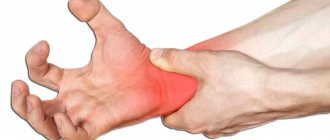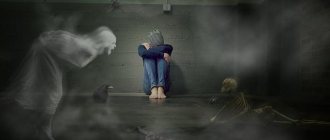Every person experiences strong excitement or anxiety from time to time. Such feelings arise due to the influence of negative factors. These include dangerous situations, various problems and life difficulties. But if persistent anxiety is not associated with certain situations or objects, then this may indicate the development of a psychopathic condition such as an anxiety disorder.
This disorder can develop in people of different ages, regardless of their gender, social and marital status. Anxiety is characterized by a set of specific symptoms that greatly complicate a person’s life. However, with timely consultation with specialists, you can completely get rid of anxiety disorder. In some cases, a simple conversation between the patient and a psychotherapist is sufficient for healing, but sometimes treatment requires more serious measures.
How does anxiety disorder manifest?
The manifestations of this pathology can vary greatly from patient to patient. The clinical picture depends, first of all, on the personality and character of the person. But the most important symptom that allows one to judge the presence of pathological anxiety is the prolonged presence of anxiety and fear in situations that do not cause concern for most people.
Experts divide all the symptoms that arise from an anxiety disorder into two main categories:
- Symptoms from the emotional sphere. In addition to causeless and inexplicable anxiety, the sick person experiences difficulty concentrating, increased nervousness and emotional tension, and a feeling of complete emptiness. In this state, the patient cannot sit still, it seems to him that something terrible is about to happen, and he is looking for signs confirming the onset of danger. The thought stream moves at high speed, and a person is not able to control this process.
- Physical symptoms include increased heart rate and heavy sweating, dizziness, shortness of breath and tremors in the limbs. A person constantly has a headache, he cannot sleep normally, he feels increased fatigue and muscle tension. There is also a malfunction of the digestive and excretory systems, diarrhea and frequent urge to urinate.
Since anxiety is the body's response to some threat, it can have a wide range of manifestations. In this way, the body demonstrates its readiness to flee or fight.
However, people suffering from anxiety disorder cannot always adequately assess their condition. The various physical manifestations of this mental pathology are often perceived by patients as symptoms of some kind of body disease.
Acknowledging concerns
It is one of the most commonly untreated conditions experienced by the vast majority of the world's population. Our lives are stressed because we don't realize how much worry has consumed us, and learning to let go of worry can be as simple as taking five minutes a day to clear our mind. However, we should not fall into the reckless course of believing that our problems can only be solved if we constantly think of solutions.
Anxiety hangs over our heads when our minds are always racing; When we cannot focus on the moment that surrounds us. Knowing that we have difficulty seeing and living in the moment is the first step to solving our unhappiness, even if we are not aware that we are unhappy.
Types of Anxiety Disorders
Experts identify several types of anxiety disorders, which differ in their symptoms and course characteristics. Treatment for anxiety in each of these cases will be different:
- generalized anxiety disorder. In this state, a person experiences increased anxiety, not caused by any situation or object. The symptoms are quite stable, they are observed for 6 months or more. In addition to anxiety, a person experiences motor tension, and also becomes hyperactive and prone to tearfulness. A sick person can also be identified by his appearance - he is quite specific. The face and posture of the individual are quite tense, the person is very restless, his eyebrows are frowned, and trembling in the body is visible from the side, the skin is very pale;
- panic disorder is characterized by constant panic attacks. They arise unexpectedly, for no apparent reason, and a person is not able to control them. The patient may also experience fear of the panic attack itself. In this case, he will try to avoid situations that could cause a panic attack;
- Obsessive-compulsive disorder is associated with the occurrence of obsessive thoughts that bring anxiety and discomfort. A person may constantly worry that they forgot to do something important, and this may affect their safety. The patient's behavior becomes strange and inappropriate. He may wash his hands or clothes for hours to get rid of pathogens, hide dangerous objects in inaccessible places, etc.;
- A phobia is a persistent and greatly exaggerated fear. Such fear can be caused by objects or situations that are completely safe or pose minimal danger. There are a large number of varieties of this disorder; they are distinguished based on the characteristics of the objects of fear. A person suffering from a phobia tries in every possible way to avoid contact with an object that causes him horror, but this leads to increased anxiety and aggravation of the situation;
- Social anxiety disorder is a fear of being judged negatively by other people. People suffering from social phobia are extremely shy and timid. They are afraid to speak in front of large crowds, avoid public places or do not go out at all;
- Post-traumatic stress disorder occurs as a result of experiencing trauma or a life-threatening situation. In this case, anxiety arises constantly and almost never subsides. A person is haunted by intrusive memories and nightmares about a traumatic event.
A modern disease can be called anxiety-depressive disorder, which belongs to neuroses. If a patient exhibits symptoms of anxiety disorder and depression equally, then we can talk about the development of a mixed form of pathology.
Anxiety disorder is a disease in which a person is aware of his problems. With this pathology there is no personality transformation.
Steps to Control Anxiety
Before diving into the many anxiety medications, it's helpful to learn about how anxiety affects us and the steps we can take to reduce it for good. They are relatively simple, and following them can significantly improve our mood over time. However, these steps will not work if the anxiety you are experiencing is caused by medications, medications, or illnesses. Such causes must be considered on a biological rather than a psychological scale.
- Learn Our Anxiety - First, let's learn our thoughts. What are we always thinking about? Why do we think? Is there anything we can do to eliminate these thoughts in the moment, and if not, why do we choose to focus on them when we can't do anything about them at this time?
- Take action - Decide on a medicine or remedies. We need to make sure we are comforted and help our minds and bodies relax, losing ourselves in the moment and not being afraid to put all thoughts aside as our muscles and heart rate relax.
- Follow a schedule - Once we have decided on what defenses we need, we must be consistent in handling those controls. Schedule a time every day or every other day to begin treatment. This is when we can change the medications we have also chosen, decide if one is better than another or if we prefer something else. The more consistent we are in using our medications, the more successful we will be in eliminating anxiety.
- Involve Family or Friends Connect with your loved ones. If we tell our family or friends about new activities or foods/drinks we are taking to relieve stress in our lives, we are more likely to continue taking those remedies. This will also give us a way out. If the anxiety we experience is suppressed from within, then connecting with others helps us greatly so that we can connect with others on the path to healing. This way we know we are not alone.
- Break the Cycle - Of Unwanted Thoughts! After trying treatment (or more) for two weeks, take a close look at the stress and anxiety you are currently experiencing. Has it decreased? Do we feel a little happier? Or are we the same? We may need to switch to a different medication, or we may find that the medications we choose work well for us. In any case, we must evaluate whether our anxiety is decreasing and whether we can concentrate better in the moment.
- Let go of worries Once you find and use the right remedies, it's time to put aside all the unwanted thoughts and worries that once plagued our bodies and minds! Recognizing a new position in events/situations/topics/etc. is the key to letting go of our past fears of the future.
Causes
To date, there is no clear understanding of how anxiety disorders arise. This pathology can develop under the influence of various mental and somatic factors.
Anxiety can arise in response to external stimuli, with various somatic diseases, brain injuries and endocrine disorders. Anxiety conditions can be caused by taking certain medications, narcotic and psychotropic drugs.
There are several theories explaining the causes of anxiety pathologies:
- From the point of view of psychoanalysis, pathological anxiety indicates that a person has a forbidden or unacceptable need. At a subconscious level, actions that have an aggressive or intimate overtones are prevented, which leads to the development of anxiety disorders. Anxiety in this case displaces or restrains this unacceptable need.
- Behavioral theory describes anxiety as a reflexive response to painful or frightening stimuli. Anxiety may further arise in the absence of these factors.
- Cognitive psychology focuses on mental images that precede the onset and progression of anxiety symptoms. As a rule, the thoughts of a sick person are twisted and irrational.
- The biological theory believes that pathological anxiety is the result of a failure of metabolic processes in the brain. It has been noted that a sharp increase in the production of neurotransmitters leads to an increase in anxiety levels.
In addition, a pattern was discovered between a person’s tendency to develop anxiety pathologies and sensitivity to increasing concentrations of carbon dioxide in the air. People suffering from anxiety disorders react to even slight fluctuations in this indicator.
The risk of developing pathological anxiety largely depends on the characteristics of a person’s character and temperament.
Why do anxiety conditions occur?
The problem can approach a person from different directions. As usual, choosing the weaker one. For example, the active development of an anxiety disorder can provoke constant stress on the body, experienced psychological trauma, and disruption of interneuron connections. Some experts believe that predisposition to anxiety disorders is genetic. People with mitral valve prolapse and low blood sugar are at risk.
Various psychoactive stimulants also harm the normal psychological state. We are talking not only about prohibited amphetamine or cocaine, but also about caffeine.
Treatment
Just as in the correction of other types of psychological disorders, treatment of anxiety is primarily carried out using psychotherapeutic methods. Medications are used extremely rarely; usually the patient feels noticeable relief after the first conversation with a psychotherapist. But the use of beta-blockers allows you to relieve vegetative symptoms, tranquilizers can eliminate anxiety and muscle tension, and normalize sleep. If the patient has been diagnosed with a mixed disorder, then antidepressants may be taken. Treatment with all these drugs should be carried out under the supervision of a doctor and only on his recommendation.
Among psychotherapeutic methods, the most successful in treating various anxiety disorders is cognitive behavioral therapy. Its main idea is the doctrine that a person’s thoughts influence a person’s psychological state, behavior and physical health. While working with the patient, the psychotherapist identifies irrational thoughts, points them out and corrects the patient’s consciousness. Therapy is structured in such a way that a person himself comes to the right conclusions under the guidance of a doctor.
After completing a course of psychotherapy, the patient not only copes with his fears, but also learns to confront them in the future. To achieve lasting results, it will take from 5 to 20 sessions. In this case, the patient is given homework, during which it is possible to speed up treatment.
An equally effective method for correcting anxiety disorders is hypnosis and suggestion. Psychotherapists often combine behavioral and hypnosuggestive therapy. When a patient is in a hypnotic trance, the therapist can reinforce new patterns of thinking and behavior. Thus, during treatment, the effect is on an unconscious level.
How to deal with anxiety on your own
Despite the fact that any psychological and mental disorders are best dealt with by qualified doctors, there are methods that can be used at home. If you feel an anxiety attack coming on, try the following:
- Try to relax and feel your body. List the signs of your anxiety, do not run from this feeling, but accept it.
- Do a few breathing exercises to help you calm down quickly. Take several deep breaths, exhaling as relaxed as possible. It is better to breathe by holding your breath in a count. Several cycles of such exercises normalize the condition.
- Learn to enter a resourceful state. By this term, experts mean a sense of personal strength. You should feel that you have enough internal resources to solve the problems facing you at the moment. Try to remember the last time you felt this way. Return to that moment mentally or reproduce the situation in life. Each person has his own source of strength and joy. This could be meetings with loved ones, doing a favorite activity or sport, communicating with animals, walking in the forest, visiting a bathhouse and much more. Be sure to set aside time to do things that make you happy. This will reduce feelings of anxiety.
- Try to imagine your body and identify the place where the anxiety is located. Take a pencil in your hand, and then mentally draw a line from your anxiety to it. Then draw your feeling. There is no need to control or analyze what is happening, just let your hand move on its own. The drawing must be torn or burned. This exercise allows you to relieve tension at a specific moment.
- Be sure to review your work schedule. It is necessary to allocate time for proper rest and sleep. Particular attention should be paid to the diet.
- Try to protect yourself from negative information. Avoid watching TV shows and movies with a dark, negative tone.
- It is necessary to realize and accept the fact that a person cannot completely control everything that happens around him. You need to learn to trust the people around you. If anxiety is caused by situations that you cannot influence, then you need to change your attitude towards it.
- Get rid of the habit of always expecting the worst. As soon as negative thoughts begin to appear in your head, you need to tell yourself: “Stop!” But there is no need to protect yourself from these thoughts, but you need to rethink them. You should separate reality and frightening fantasies.
Often anxiety has a secondary benefit, but it is not realized by the person. As a rule, similar conditions arise in people who are not fulfilled in life. It is more convenient for them to be in a state of anxiety. In their opinion, in this way they will be able to prevent negative events. But in reality, they are only protecting themselves from feeling guilty about what might happen. After all, you can always say: “I said that this would happen and I was worried about it, so it’s not my fault for what happened.”
But being in a state of anxiety and taking real steps to prevent a tragic situation are two different things. To identify the secondary benefit of your anxiety, you need to honestly answer yourself what negative things can happen or positive things won’t happen if the anxiety disappears. After that, you can understand what anxiety gives you, whether it is possible to get rid of something bad or prevent negative events with its help.
By following these recommendations, you can cope with anxiety on your own. But this requires sufficient willpower and a desire to change your life for the better. It is quite difficult to get rid of serious forms of anxiety disorders without visiting a specialist. Therefore, you should not put off visiting a psychotherapist if you notice signs of this or another psychological disorder.









